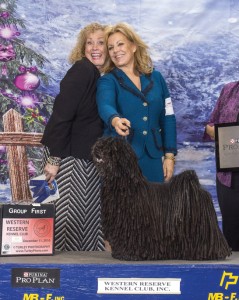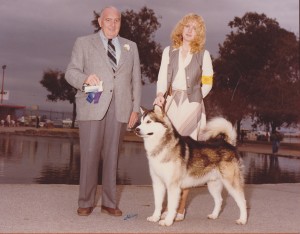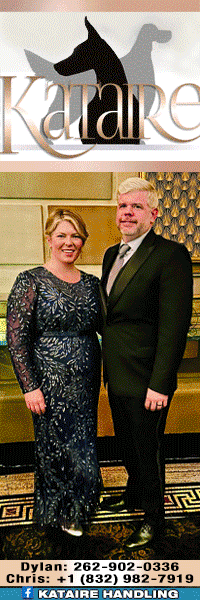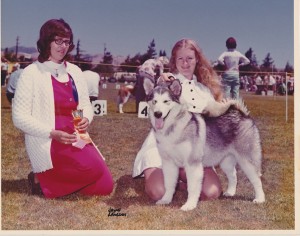From San Quentin to Woofstock: Kimberly Meredith-Cavanna’s Remarkable Career

Click here to read the complete article
74 – June, 2017
by Joan Harrigan
Everyone has a story about finding “their breed.” Perhaps it involves growing up with a German Shepherd Dog, or devouring a series of books about collies, or seeing Salukis at a dog show and being captivated by their grace. Kimberly Meredith-Cavanna’s story is unique—she fell in love with the Alaskan Malamute inside California’s San Quentin State Prison.
Meredith-Cavanna had grown up with a Chihuahua, and owned a Keeshond and two Bassets early in her married life. She’d always loved wolves and arctic animals, and in 1971, while visiting her grandfather, the retired warden of San Quentin, she encountered “the most beautiful animal I had ever seen.” Meredith-Cavanna and her husband were walking on the grounds of her grandfather’s home, the Warden’s Estate, which sits high above the prison with views of the Golden Gate Bridge. A Malamute walked slowly up the hill, and stood in profile, gazing out at the scene below. Meredith-Cavanna recalls how much the dog reminded her of a wolf; turning to her husband, she said “I want one!”
“You’re out of your mind,” her husband replied. He wasn’t altogether incorrect—they lived in a condo and drove a Corvette convertible. “So naturally,” Meredith-Cavanna says, “I started looking for one the next day!” Her first Malamute came from a breeder who was the wife of a San Francisco policeman and lived in Pacifica, California. “There were two puppies—one pet and one show prospect,” Meredith-Cavanna says. “The show puppy was beautiful, so naturally I wanted him.” Three weeks later, the breeder called and invited her to a fun match in Berkeley.
“The puppy wasn’t trained, and I think we came in dead last,” Meredith-Cavanna says. But the match served its purpose—introducing her to dog people in obedience as well as conformation. “I loved it!” she says. This was an era when fun matches were common—and huge, at least in California. “We’d have as many as a thousand puppies at a fun match,” she says. “And we had them all the time.”
Selective—and Highly Successful Breeding
That first Malamute led Meredith-Cavanna to breed her first litter in the early 1980s. Her kennel name “Atanik” came from the name of a prehistoric native community on the north slope of Alaska; the word means “the big one.” She still lives in Pleasant Hill, near San Francisco, and her kennel has never been large—or housed in a kennel. “I never had more than three or four at a time, and they have always been housedogs,” she says.
In describing the breed, Meredith-Cavanna says that Malamutes are both wonderful and “your worst nightmare.” They can be very dog-aggressive, though they are typically great with both adults and children. “You must be alpha, and they must respect you,” she says. “This is not an ‘easy’ breed, and they have a very high prey drive.”
Meredith-Cavanna has produced more than 60 champion Malamutes. A number of her dogs have all-breed Best in Show wins, as well as multiple national specialty Bests of Breed. Her breeding program has been limited by any standard—“I breed maybe every five years,” she says. “And then, only when I want to keep a puppy myself. I’ve been very fortunate that other breeders have purchased and shown my dogs.” Not that her own dogs didn’t do a lot of winning—she’s owned the Winners Bitch at three national specialties, and a bitch that she bred, BIS/BISS Ch Atanik’s Silverice Hot Pants ROM won the national specialty, BOB at Westminster, and was 2004’s number one Malamute, all breed and breed systems. Another of her Malamutes, Atanik’s Snopaw I’m Awesome! set the breed record for the youngest group win, at 9 months and 2 weeks of age—a record which stands to this day.

And the Dobermans…
Though Meredith-Cavanna has owned and shown a variety of breeds—Akitas, Bernese Mountain Dogs, Lhasa Apsos, Clumber Spaniels, Basset Hounds, Whippets, and a Border Collie—Malamutes and Dobermans have been her primary interest. “I’ve had Dobes for 20 years, but just bred my first litter a year ago,” she says. Her first Doberman, “Thriller” was a son of BIS/BISS Ch. Soquel’s Distant Thunder. “I thought I’d discovered the perfect breed,” Meredith-Cavanna recalls. “He never chewed his toys, and was perfectly behaved. Doberman people laughed at me when I said that I thought all Dobes were like him,” she says.
In 2010, Meredith-Cavanna judged the Working Group at Westminster, and awarded Group One to the Doberman bitch “CJ,” Ch. Allure Blazing Star Alisation. Carmen Pitts, CJ’s breeder and owner, later approached Meredith-Cavanna at a show. Pitts had heard she was looking for a Doberman bitch, and she offered her a CJ daughter by Ch. Eastwick’s Meadow Monster. “Moxie” became GCh. Allure Fireworks and produced Meredith-Cavanna’s first Doberman litter.
Dobermans and Malamutes are both working breeds, but very different in personality—after all, they were bred for very different jobs. “Malamutes are more independent,” Meredith-Cavanna says. “And they are not watch dogs—if you fed them, they’d let you take anything you wanted.” Dobermans are superb guardians, and “my Velcro dogs,” she says. They aren’t all as careful to preserve their toys as Thriller was—to this day, Meredith-Cavanna has some of his puppy toys!
Kimberly loved showing her dogs, but also took great pleasure in simply learning about different breeds, their histories, and purposes. The transition to judging was logical, and, as she puts it, “I’m a masochist!” She started with the Working breeds, and was approved to judge Akitas and Alaskan Malamutes in 1992. Eleven years later, she was approved for the Working Group; currently, she judges Working, Sporting, Herding, Non-Sporting, Hound, and Miscellaneous breeds, as well as Best in Show and Junior Showmanship. “Every judge loves to find a ‘great one,’” she says. “But I love just being with the dogs. I talk to them, play with the puppies; frankly, I like dogs better than people!”
Her judging career led to romance when fellow judge Sharon Newcomb wanted to introduce her to Barry Cavanna, a retired soil scientist who lived in Ohio and showed German Shepherds and Flat-Coats. “She thought we would be awesome together, but at the time, I was the president of the ‘Man-Haters Club,’” Meredith-Cavanna laughs. She resisted, but after some time, the two started an email correspondence, which led to phone calls. “That was back when you were charged per minute, and we both had $800 or $900 phone bills,” she recalls. The two married in June 2013—“he’s just a great man, my best friend, and my greatest ally,” Meredith-Cavanna says.
“Woofstock”: Revisiting the Summer of Love with Dogs
Showing dogs is supposed to be enjoyable—even for professional handlers. However, as weekend dog shows have morphed into multi-day clusters, they’ve become something of an endurance test for dogs and exhibitors. Meredith-Cavanna set out to do something to change that—at least for her Contra Costa County Kennel Club.
At the time “Woofstock” was born, the CCCKC was bankrupt—a member had stolen their treasury. They needed to regain solvency, and couldn’t afford to lose money on a show. Meredith-Cavanna envisioned something more like a festival, harkening back to the days of Haight-Asbury and the Summer of Love. “I had a hare-brained idea,” she says. “I was brought up during that era, and everyone loves it—there was great music and clothes, and it was a special time.”
The club expanded the show to four days, moved to a new fairground, and bought all the tie-dyed items they could find. They wanted a less formal show—playing music all day would set the tone. Club member Bob Birdwell was a musician—he brought his guitar to play at lunchtime at that first Woofstock in 2008, and now coordinates all music played during the show.
Today, Woofstock is a huge show, but no less fun than at its inception. Contra Costa and Yosemite Kennel Clubs sponsor the show; five Contra Costa members, including Meredith-Cavanna and her husband, Ken and Eva Berg, and Philip Freilich work all year to stage the event. They spend days hanging speakers throughout the fairgrounds, and the music is continuous. Group judges are asked for their favorite or most meaningful songs, to be played while they are judging. Sometimes, the club has a bit of fun with a judge—Larry Abbott, whose pate is devoid of hair, judged his first-ever Toy Group to the rock musical theme “Hair.”
Last year, Woofstock had an entry of more than 10,000 over four days, with 316 majors. Judges and exhibitors dressed in hippie attire, and in addition to the usual AKC classes, there were costume contests for men, women, children—and canines.
“It’s a lot of work, but worth it!” Meredith-Cavanna says. This year, the 10th Woofstock on June 8–11 coincides with the 50th anniversary of the Summer of Love, and there will be 25 specialties and 99 supported entries. And, if Meredith-Cavanna has any say, a lot of relaxed fun!
Declining Dog Show Entries: What to do?
Shows like Woofstock and Morris & Essex have made a pleasurable experience for exhibitors a top priority. But these are trying times for the sport of purebred dogs. “I try not to be a pessimist—I love our sport. It will survive. There are many of us who remain positive,” Meredith-Cavanna says. But she sees the issues—one of which is affordability, both for sponsoring clubs and exhibitors.
“AKC has approved too many shows that are too close together,” she says. “There are too many small shows, drawing 500 or 600 dogs.” The smaller clubs sponsoring them can’t afford to fly judges in from other areas, so they repeatedly draw from a geographically-convenient pool. Entries decline, the shows barely break even or lose money, and they enter a death spiral.
For exhibitors, “the economy has been horrible for 10 years,” Meredith-Cavanna says. “Entry fees, handling fees, and parking costs keep rising, and owners have to balance a house payment, food, and dog show costs. What do you do?”
The national issue of declining show entries is multi-faceted, but Meredith-Cavanna points to the FCI’s model of returning funds to the sponsoring clubs as a possible partial solution. “I was just judging in Chile,” she says. “They flew in judges from all over, had plenty of tenting on a beautiful soccer field—all for 600 dogs.” She asked how the club could afford to do all this, and was told that the FCI supported a portion of the cost of the show. In the U.S., without the AKC’s financial support, small clubs simply can’t afford to absorb any portion of a show’s overhead. All expenses are passed on to the exhibitors, which leads to increased entry fees, charges for grooming space, and parking fees. The result is declining entries—it’s a vicious cycle, Meredith Cavanna says.
“Either the AKC needs to supplement the clubs, as FCI does, or we need not to have so many shows so close together,” she concludes. “We can’t do anything about the economy.”
What Meredith-Cavanna can do is set an example, and welcome newcomers—whether human or canine—to the sport. “My number one rule is to be kind to exhibitors and dogs,” she says. “Judges can be short-tempered—they are on their feet all day long, but we don’t have a job without the exhibitors! If you are unkind to them or make them feel unwanted, they will just go away.”
And, Meredith-Cavanna knows what it is like to be holding the show lead. She showed her own dogs in Bred By Exhibitor, until surgery prevented her from running fast enough to move them. “It was heartbreaking,” she says.
“I try not to look at the gloom and doom,” she says. “There will always be dedicated breeders who want to show dogs.” With luck, many of them will be like Meredith-Cavanna—dedicated to learning and growing in the sport, and as interested in giving back as accumulating ribbons. Not everyone can start a phenomena like Woofstock, or become a sought-after judge, but every fancier can contribute somewhere, and Kimberly Meredith-Cavanna has set a great example to follow.
Short URL: http://caninechronicle.com/?p=126717
Comments are closed












